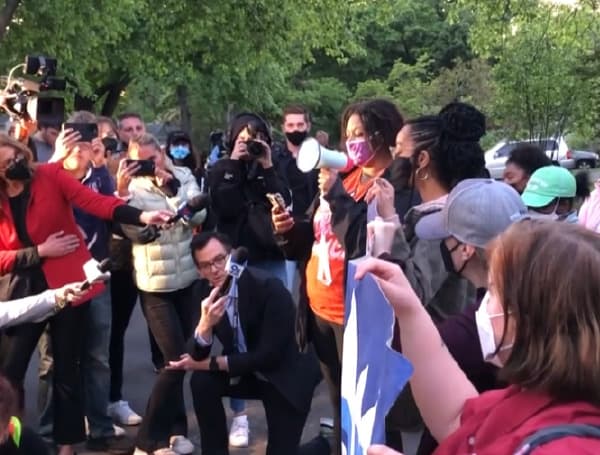Attorneys for Gov. Ron DeSantis told the Florida Supreme Court late Monday that a controversial 2021 law about protests that turn violent would not apply to peaceful demonstrators, disputing that the law is unconstitutional.
A 25-page brief was the latest move in a long-running battle about a law that DeSantis championed after nationwide protests following the 2020 death of George Floyd, a Black man who was killed by a Minneapolis police officer. Dubbed the “Combating Public Disorder” law, the measure included a series of steps aimed at cracking down on people who participate in riots or a “violent public disturbance.”
Chief U.S. District Judge Mark Walker in 2021 issued a preliminary injunction against the law, describing it as unconstitutionally “vague and overbroad.” The state appealed, but the 11th U.S. Circuit Court of Appeals in January requested help from the Florida Supreme Court with what it called a “novel” issue — how to determine the meaning of the word “riot” in the law.
In the news: WATCH: Mass Shooting Averted As Masked, Armed Man Attempts To Enter Mons Venus In Tampa
In Monday’s brief, attorneys for DeSantis argued that, “to violate the statute, a defendant must be active in violence.”
“Nonviolent protest activity will never violate the statute, regardless of the behavior of others present,” said the brief, filed by lawyers in Attorney General Ashley Moody’s office and DeSantis’ office. “It is also clear that a person does not violate the statute unless he acts with common intent to assist in violence.”
Groups such as the Dream Defenders and the Florida State Conference of the NAACP challenged the law,, arguing that it would have a chilling effect on First Amendment rights. Among their arguments has been that the law could lead to peaceful demonstrators facing charges when protests turn violent.
Walker issued a 90-page ruling that pointed to vagueness in the measure.
“Though plaintiffs claim that they and their members fear that it (the law) will be used against them based on the color of their skin or the messages that they express, its vagueness permits those in power to weaponize its enforcement against any group who wishes to express any message that the government disapproves of,” Walker wrote. “Thus, while there may be some Floridians who welcome the chilling effect that this law has on the plaintiffs in this case, depending on who is in power, next time it could be their ox being gored.”
In the news: Watch: Burglary Suspect In Florida Hits Police Officer Head-On In Stolen Car
A panel of the 11th U.S. Circuit Court of Appeals heard arguments in March 2022 in the state’s appeal. But the Atlanta-based court said in January that it was deferring a ruling on the preliminary injunction until after the Florida Supreme Court could weigh in on the definition of riot.
While such moves are unusual, the federal appeals court at times sends cases to the Florida Supreme Court to help sort out the wording of state laws — a move known as certifying a question
In passing the 2021 measure, the Legislature changed a law that barred riots. The revamped law says that a “person commits a riot if he or she willfully participates in a violent public disturbance involving an assembly of three or more persons, acting with a common intent to assist each other in violent and disorderly conduct, resulting in injury to another person, damage to property or imminent danger of injury to another person or damage to property.”
The appeals court said plaintiffs, for example, have argued that the law does not define what it means to participate in a violent public disturbance.
“According to the plaintiffs, every person present could be arrested and charged with rioting because each willfully participated in the protest, which became a violent disturbance — even those who did not engage in any violence or disorderly conduct themselves,” the appeals court said. “The plaintiffs express concern that protesters could be charged with rioting if they remained on the scene after violence erupted and continued to protest, assisted those who were injured or filmed the events.”
In the news: Report: Miami And Orlando Rank Among America’s Worst Places For Traffic
But in the brief Monday, attorneys for DeSantis disputed such arguments.
“Other conduct may well fall within the ambit of the statute — for example, supplying weapons at the site of a disorderly protest. But protesting wholly nonviolently does not violate the statute simply because the peaceful protester may know that others at the same protest have turned to violence,” the brief said.
Groups challenging the law have not filed their initial briefs at the Supreme Court.
Android Users, Click To Download The Free Press App And Never Miss A Story. Follow Us On Facebook and Twitter . Signup for our free newsletter . We can’t do this without your help; visit our GiveSendGo page and donate any dollar amount; every penny helps.


